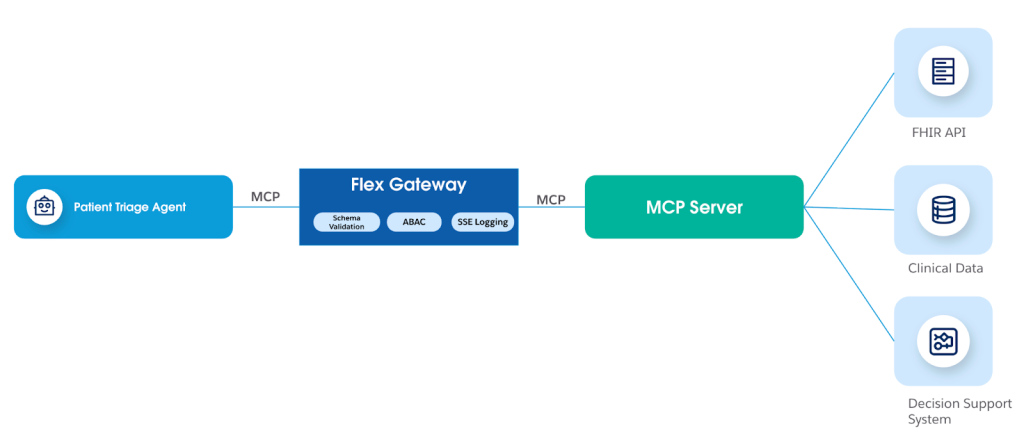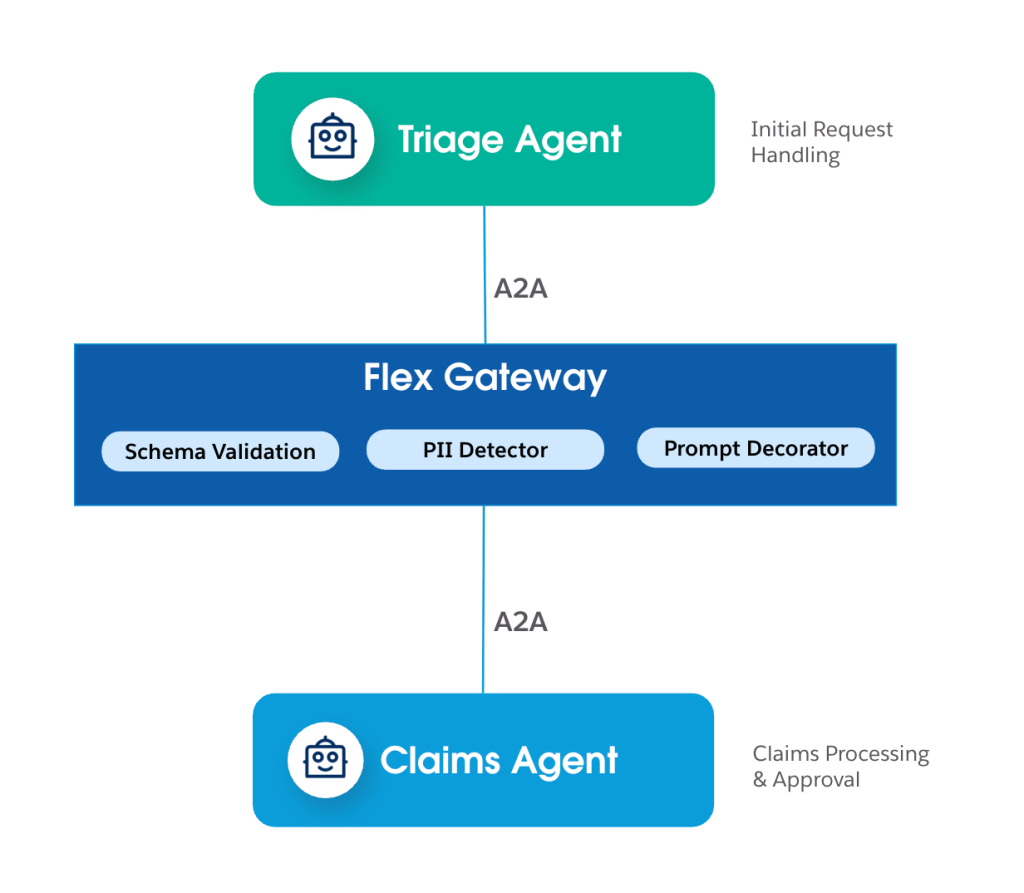Healthcare and life sciences (HLS) organizations are moving toward an agentic future where AI agents autonomously retrieve information, collaborate across systems, and take action. From patient triage assistants to clinical trial monitors, agents are reshaping how care is delivered, reimbursed, and researched.
AI risks HLS companies face
This vision of the agentic enterprise in healthcare brings speed and scale along with new risks.
Protected Health Information (PHI) leaks across agent prompts and responses
AI systems may unintentionally expose or retain sensitive patient information during interactions. If PHI such as names, diagnoses, or medical histories is included in prompts or responses and not properly redacted or isolated, it can lead to privacy violations. This risk highlights the need for strong data handling policies, prompt filtering, and compliance and security standards.
Toxic outputs in patient-facing communications
AI-generated messages may include inappropriate, insensitive, or harmful language, even unintentionally. This can occur when models draw from unfiltered data or lack safeguards for tone, empathy, and professionalism. Toxic or dismissive outputs can damage patient trust, cause emotional distress, or lead to unsafe behaviors, emphasizing the need for content moderation, tone control, and human oversight
Hallucinations and unsupported clinical recommendations
Large language models can produce hallucinations, which are responses that sound confident but are factually incorrect, outdated, or medically unsupported. In a healthcare context, this can lead to unsafe advice, misdiagnoses, or the spread of misinformation. It underscores the importance of grounding AI responses in validated medical sources, implementing fact-checking layers, and maintaining human review for clinical decision support.
Compliance gaps
AI systems in healthcare must comply with complex data privacy and regulatory frameworks. Non-compliance may occur if systems collect or process more data than necessary (violating HIPAA), fail to ensure user consent or data erasure rights (violating GDPR), or bypass medical device regulations (violating FDA or similar oversight). Organizations must implement robust governance, documentation, and audit mechanisms to maintain regulatory alignment and patient trust.
To succeed in this agentic future, healthcare organizations must be able to innovate with agents responsibly while embedding security and governance at every layer. MuleSoft Flex Gateway makes this possible with policy-driven guardrails for the Model Context Protocol (MCP) and Agent-to-Agent (A2A) communication.
Agentic enterprises need governance
The margin for error is slim in healthcare. Agents are embedded in mission-critical clinical and operational workflows, which means they need to be governed to the highest degree. To ensure top-level agent governance, consider the following:
- Security: Prevent unauthorized access to EHRs and payer systems
- Privacy: Protect PHI and Personally Identifiable Information (PII) in every request and response
- Compliance: Meet HIPAA, GDPR, and FDA Part 11 standards
- Fairness: Ensure care decisions are consistent and equitable
- Trust: Provide auditability and transparency for regulators and patients
Securing agent-to-system flows with Flex Gateway MCP policies
MCP (Model Context Protocol) allows agents to interact directly with APIs, such as FHIR servers or clinical decision support tools. Flex Gateway enforces MCP guardrails through:
- MCP Support: Enables MCP servers with SSE (Server-Sent Events) support
- MCP Schema Validation: Blocks malformed or injected requests before they reach backend APIs
- MCP Attribute-Based Access Control (ABAC): Uses Cedar rules to enforce role- or program-based access
- MCP SSE Logging: Captures every event stream for HIPAA-compliant audits and anomaly detection

Flex Gateway A2A Policies to govern agent collaboration
Modern agents collaborate with each other. For example, a triage agent might hand off to a care navigation agent, which in turn coordinates with a payer claims agent. Flex Gateway ensures these agent-to-agent (A2A) interactions are secure:
- A2A Schema Validation: Prevents malformed messages between agents
- A2A Agent Card Rewrite: Routes discovery through the gateway, eliminating uncontrolled peer-to-peer calls
- A2A PII Detector: Detects and redacts PHI in agent prompts and responses.
- A2A Prompt Decorator: Adds compliance metadata (purpose-of-use, consent flags, tenant IDs) to prompts

Standard Flex Gateway policies
The same policies used in API management apply to MCP and A2A servers:
- OAuth2/JWT enforcement
- IP allow/block lists
- Rate limiting and spike control
- TLS enforcement
- Message logging and header injection
Together, these provide the defense-in-depth that an agentic enterprise requires.
New guardrail patterns shaping the agentic future
Built-in policies cover today’s risks, but the agentic future demands new types of guardrails. With the Flex Gateway Policy Development Kit (PDK), healthcare organizations can build custom controls such as:
- Toxicity and unsafe content: Clinical Toxicity Filter (new) rewrites or blocks stigmatizing or unsafe outputs in patient-facing communications
- Prompt injection defense: Prompt Sanitizer detects malicious inputs and rewrites them safely
- Anomaly detection and circuit breakers: Safety Breaker halts runaway agent traffic until reviewed
- Token management and efficiency: Token Calculator (new) tracks request/response token counts to optimize AI model calls, control costs, and enforce usage limits in high-volume healthcare scenarios
Use case example: Patient triage assistant with guardrails
Envision a healthcare provider deploying an AI-powered patient triage assistant to handle high patient volumes through a digital front door. The assistant collects patient-reported symptoms, evaluates urgency, and routes cases appropriately. Without guardrails, this introduces significant risks:
- Patients could enter prompts with stigmatizing or unsafe language, which might be repeated back in clinical notes or communications
- Large input payloads could trigger unexpected costs or latency in AI model calls
With Flex Gateway’s custom policies, these risks are mitigated:
- The Clinical Toxicity Filter automatically detects and blocks stigmatizing terms in both patient input and AI-generated responses, ensuring communications remain professional, empathetic, and clinically safe
- The Token Calculator tracks input/output token usage in real time. If a patient submits an unusually long description (e.g. copy-pasting their full medical history), the policy enforces token limits to control cost and response latency, while still allowing safe, compliant triage
With these guardrails in place, the triage assistant remains safe, cost-efficient, and compliant, while improving patient experience and protecting the provider from reputational or regulatory risks.
On your way to an agentic future
An agentic future requires trust as much as innovation. With Flex Gateway’s MCP and A2A policies, plus extensible guardrails via the PDK, HLS organizations can:
- Protect PHI and comply with HIPAA, GDPR, and FDA regulations
- Prevent toxicity and hallucinations from affecting care
- Monitor token usage to ensure efficient and sustainable AI deployments
- Power use cases like safe, scalable patient triage assistants without compromising trust
Flex Gateway is your policy-driven trust layer for the agentic future of healthcare. Ready to build governance and security into your AI strategy? Learn how MuleSoft Flex Gateway can help your organization deploy AI agents responsibly – with governance, compliance, and performance built in from day one. To learn more, explore Flex Gateway for Healthcare or connect with our team to start your agentic enterprise journey.









